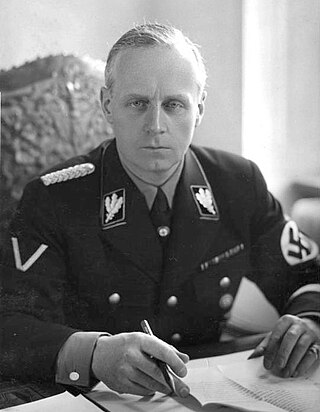
Ulrich Friedrich-Wilhelm Joachim von Ribbentrop was a German politician and diplomat who served as Minister of Foreign Affairs of Nazi Germany from 1938 to 1945.

1939 (MCMXXXIX) was a common year starting on Sunday of the Gregorian calendar, the 1939th year of the Common Era (CE) and Anno Domini (AD) designations, the 939th year of the 2nd millennium, the 39th year of the 20th century, and the 10th and last year of the 1930s decade.
1932 (MCMXXXII) was a leap year starting on Friday of the Gregorian calendar, the 1932nd year of the Common Era (CE) and Anno Domini (AD) designations, the 932nd year of the 2nd millennium, the 32nd year of the 20th century, and the 3rd year of the 1930s decade.

Berchtesgaden is a municipality in the district Berchtesgadener Land, Bavaria, in southeastern Germany, near the border with Austria, 30 km (19 mi) south of Salzburg and 180 km (110 mi) southeast of Munich. It lies in the Berchtesgaden Alps. South of the town, the Berchtesgaden National Park stretches along three parallel valleys.

Sopot is a seaside resort city in Pomerelia on the southern coast of the Baltic Sea in northern Poland, with a population of approximately 40,000. It is located in Pomerania Province and has the status of county – the smallest city in Poland to have that status. Sopot lies between the larger cities of Gdańsk to the southeast and Gdynia to the northwest. The three cities together form the Tricity metropolitan area.

The Berghof was Adolf Hitler's holiday home in the Obersalzberg of the Bavarian Alps near Berchtesgaden, Bavaria, Germany. Other than the Wolfsschanze, his headquarters in East Prussia for the invasion of the Soviet Union, he spent more time here than anywhere else during his time as the Führer of Nazi Germany. It was also one of the most widely known of his headquarters, which were located throughout Europe.

The Pugwash Conferences on Science and World Affairs is an international organization that brings together scholars and public figures to work toward reducing the danger of armed conflict and to seek solutions to global security threats. It was founded in 1957 by Joseph Rotblat and Bertrand Russell in Pugwash, Nova Scotia, Canada, following the release of the Russell–Einstein Manifesto in 1955.
A grand hotel is a large and luxurious hotel, especially one housed in a building with traditional architectural style. It began to flourish in the 1800s in Europe and North America.

Obersalzberg is a mountainside retreat situated above the market town of Berchtesgaden in Bavaria, Germany. Located about 120 kilometres (75 mi) south-east of Munich, close to the border with Austria, it is best known as the site of Adolf Hitler's former mountain residence, the Berghof, and of the mountaintop Kehlsteinhaus, popularly known in the English-speaking world as the "Eagle's Nest". All of the Nazi era buildings were demolished in the 1950s, but the relevant past of the area is the subject of the Dokumentationszentrum Obersalzberg museum, which opened in 1999.

Bad Nauheim is a town in the Wetteraukreis district of Hesse state of Germany.

The Grand Hotel Heiligendamm is a luxury hotel and gated community in Heiligendamm on the Mecklenburg Baltic coast in Germany.
Adolf Hitler's directives, or Führer directives (Führerbefehle), were instructions and strategic plans issued by Adolf Hitler himself over the course of World War II. The directives covered a wide range of subjects, from detailed direction of the Armed Forces' operations during World War II, to the governance of occupied territories and their populations. In addition to being a reflection of his personality and strategic interests, they were also a reflection of the larger philosophy of the Nazi regime.

The government of Nazi Germany was a totalitarian dictatorship governed by Adolf Hitler and the Nazi Party according to the Führerprinzip. Nazi Germany was established in January 1933 with the appointment of Adolf Hitler as Chancellor of Germany, followed by suspension of basic rights with the Reichstag Fire Decree and the Enabling Act which gave Hitler's regime the power to pass and enforce laws without the involvement of the Reichstag or German president, and de facto ended with Germany's surrender in World War II on 8 May 1945 and de jure ended with the Berlin Declaration on 5 June 1945.
Events in the year 1939 in Germany.
The following events occurred in January 1939:
The following events occurred in April 1939:
The following events occurred in June 1934:
The following events occurred in March 1938:
The following events occurred in September 1938:













